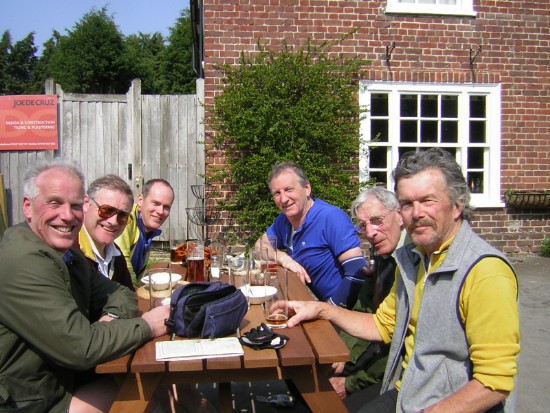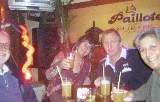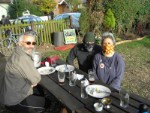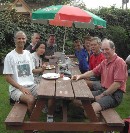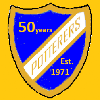The Potterers Club-Read it here... - Potterers Cycling Club
The Potterers Cycling Club
Pottering in Kent for 50 years !
The Potterers Cycling Club
Pottering in Kent since 1971
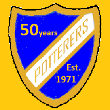



Words > Articles
The Potterers Club An Abridged Version (From Dave Rodd) Of The Original Book By G Lacy Hillier
Chapter 1: Three cyclists by the sea.
It was a dull dismal day at Yarmouth – the rising tide tumbling in whitecapped rollers upon the beach – a sharp, cold, gusty wind from the sea. Heavy clouds overhead and heavier clouds advancing, the sea dark and menacing beneath them. Not a day for holiday-makers. Youths in flannels and straw hats shivered in the cold, while others hurried back to their hotels or lodgings. The week’s holiday, awaited so eagerly, was clearly not for holiday making, with every indication that it would get worse.
A number of cyclists made their way up and down the Drive; all types - solitary, pairs, groups and gangs, in a variety of dress. Amongst these could be seen a party of three, dressed in correct touring attire – dark grey suits with Norfolk jackets. One of these was identified by those in the know as Horace Sainton, the crack racing cyclist. Oblivious to their whispered remarks, he and his companions Ferdinand Smith and John Forrester, made their way up and down the front before concluding that Norwich had more and better attractions, and so determined to make their way hence.
As they came to this decision, the heavens opened, and donning their capes made their way out of the town towards Caister. After some miles, during which the weather became steadily worse, the sound of thunder was heard and the trio determined to find shelter. As they reached the bridge at Acle, an inn was seen and after putting their machines under shelter, they made their way indoors to the snug little parlour of the inn. The parlour was adorned with glass cases containing specimen fish, a deep fireplace and a small bar, where orders were rapidly placed and met.
Whilst the friends gazed out of the window, contemplating the weather and the prospect of another 11 miles to Norwich, the door swung open and in stepped a man clothed in oilskins. “Ghastly weather,” he said as he removed his waterproofs, then, “Hullo, Smith” as he recognised one of the three. Ferdinand Smith introduced him as Mr Iden to the others. Iden clearly knew of Sainton’s reputation and they fell into conversation about racing. After a while, he enquired as to their intentions for the rest of the day, and when the friends admitted they had no definite plan, he urged them to join him on his boat moored nearby, a wherry were there was plenty of room for them all to make themselves comfortable. The weather looked set to get even worse, so after a brief discussion it was agreed to avail themselves of Iden’s hospitality.
After arranging for safe storage of the machines, Sainton, Smith and Forrester joined Iden and they made their way to the wherry, which was, as Iden had promised, a snug well-found boat with room for six. Once inside, Sainton espied Iden’s bicycle – a very neat rakish-looking Raleigh, fitted with road-racing tyres, dropped handlebars and very much a racing machine. “I thought you said you were a pottering tourist,” said Sainton. “Well,” replied Iden, “I have a fancy for all the latest improvements, as the catalogues say, and I use it when pursuing my hobby of collecting.” “Collecting?” asked Smith. “Yes, I’m keen on moths, in fact I have rather a fine collection, nearly all my own work. The cycle enables me to get about, and the lamp is very useful for attracting the moths. I have got a lot of good specimens with it.” Iden went on to describe how he caught his specimens with a mixture of beer and brown sugar spread on tree trunks, the haunts of rare specimens, the merits of a wherry as a base, and lamented the fact that his best specimens were now stored at his rooms in town.
Ferdinand Smith clearly knew something of the hobby, and asked many questions. Eventually Iden revealed that the prize of his collection was a Rosy Marsh, which had been found close to where they now sat. “As a matter of fact,” continued Iden, “I have not sent it up to town yet, as I wanted to show it to another collector, who did not believe me.” Iden then produced a small collecting case, carefully unwrapped it and showed his capture, reposing in solitary state within. It had glossy gray wings with a tinge of red and whitish brown underneath. “Never been seen in Norfolk before, and very rare anywhere in England. I shall come back next May and try to find the caterpillar.”
The conversation turned to cycling, and Iden mentioned several places on the Continent that could be best visited by bicycle. After further discussion about the merits of the Broads as a holiday resort, and a game of cards, it was time for bed. As they drifted off to sleep, the sound of the rain pattering on the roof was all that could be heard.
Next morning, the rain had not ceased, the roads were wet and muddy, and the fields veiled in mist. The four strolled down to the inn in their waterproofs, where Iden found a letter advising him that his friends would not be able to join him until later in the week. “Why not spend two or three days with me?” he asked. “Think it over while I stroll down to the village. There’s no fun in riding in weather like this.” After Iden departed, the trio talked it over. “I don’t mind riding in the rain if I’m in reach of home,” said Sainton, “but there’s no fun in going to bed in the middle of the afternoon while one’s clothes dry out. I think we’d better stay.” After a brief discussion, the three friends agreed. On Iden’s return they set off in the wherry for Potter Heigham for some fishing, and to keep an eye out for the fellow collector, so that Iden could display his prize capture.
And so the days passed. The weather slowly improved. The doubter was seen on the second day and duly impressed, the wherry made its way up river, with various excursions until it was time to return to Acle. Iden pressed the friends to stay over the coming weekend, as he would still have room after his own friends arrived, but as they all had business to attend to, Sainton thanked their host and said that they would have to start for home on the Saturday.
As they packed their things, Iden approached Smith with a small package. “This is a rare nocturnal beetle, which may come to harm in the damp. I’ve packed it carefully in cotton wool. Would you mind taking this with you, and I’ll call for it when I return?”
“Certainly,” said Ferdinand, and rolled it up in his bundle of clothing. The three then collected their bicycle from the inn, and after a farewell drink with Iden, set off in the direction of Norwich. They reverted to their original plan to spend the night in the Maid’s Head, rose early on the Sunday morning and made their way back to town vis Wymondham and Newmarket, taking advantage of a following wind.
Chapter 2: The Potterers’ Cycling Club
The Club met at Sainton’s rooms. This was a large modern flat with spacious rooms, very comfortably furnished and decorated with various cycling prints, photographs and an original drawing from Cycling. The Potterers’ Club was not a formal body; no one could apply for election, there were no rules, no programme of events, not affiliated to the National Cyclists Union, in fact it was a group of Sainton’s friends. They joked that it was necessary to put in a number of qualifying runs to maintain membership, and one Saturday they rode down to Frensham Ponds where they ran into a cycling journalist, whom they teased with this fiction. Membership grew by recommendation; and thus reached the grand total of twenty members by its fifth anniversary.
On this occasion, most of the members were present, when a member proposed one Ripton, and another potential was rejected as unsuitable. After a song or two to piano accompaniment, Ferdinand Smith read a story of his own composition. Forrester could not stand Smith’s stories, but it was an unwritten rule that any member could offer criticism of another’s efforts, and it was accepted that this could be constructive. At the conclusion of the story, Forrester did indeed state that he had never heard such rubbish, whereupon after some discussion it was agreed that Smith would submit a story more to Forrester’s liking at the next meeting. Smith retorted that Forrester’s ideal story would consist of a list of public house and the drinks consumed therein. Sainton suggested that Smith should try and introduce a cycling theme to his next story. The evening then passed in the usual fashion before the clubmen eventually dispersed.
Chapter 3: Mr John Shap at work
John Shap lived in a neat little house in Brixton with his wife. He was sat reading the paper when he suddenly exclaimed, “Hullo, here’s another of them!” The paper contained a report of a jewel robbery, committed at the house of Mr Vincent Chester M.P. The jewellery, belonging to Mrs. Chester was valued at £6000. The settings were later found in a ditch some 5 miles away, but the stones had all been removed.
After some discussion about the likelihood of such a robbery being committed at their own home, Shap said to his wife, “The only thing worth stealing here are my fishing rods. I’m going out for a bit. Walker thinks he can get me some fishing down Newbury way.” Shap sauntered out of the house, and then hastened to catch a tramcar. The burglary was of interest because it formed the latest in a series of such robberies, occurring at large houses up and down the country. The common feature was the removal of the precious stones and discarding of the settings. There was no clue as to the perpetrators. John Shap was in fact a private detective, partner in an agency, and his wife had very little idea what he was doing when he went away on one of his ‘fishing trips’. His great success had been when, posing as an assistant butler, he had uncovered a fraud by the Head Butler who had been persistently diverting his employer’s property to his own ends. Immediately prior to the latest burglary, Shap had been on a fishing trip in the vicinity of an earlier theft and had obtained some useful information, although the firm had not been employed in the case.
Ex-Inspector Lanchester, head of the agency, was pleased to see him. Mr Vincent Chester had that day consulted him in the matter of the burglary and Lanchester promised to send down a ventilation expert to examine the premises. “Bother the ventilation!” exclaimed the M.P. “Quite so,” retorted Lanchester, but it would be better to send my man under cover. We find that gets better results.”
Shap, under the name Walker visited Mr Chester’s house The Larches, and stayed for a week, dividing his time between the ventilation and fishing. He spent much time wandering about the grounds, and engaged the gardener in conversation, seemingly in ignorance of the jewel robbery. “How do you think they got in?” he asked the gardener. “Well he didn’t come through the gates, and there’s dogs in several places in the grounds. Perhaps he flew!” Carrying his fishing tackle as a disguise, Shap’s explorations confirmed the dogs’ presence, and as he reached the herb garden his attention was drawn to a fruit tree whose branches overhung the wall. The whole area was secluded and made more so by several large bushes. He examined a low brick wall, but showing no sign that he was in any way interested in what he found. Gradually, he worked his way round to the outside gate and made his way along the line of the garden wall until he found a wide ditch and sat down in the grass to think.
After taking in the general landscape, Shap followed the ditch until he found a place where it could be crossed. Then, using his bait tin as a distraction, he crawled along the path to a point where the tree could be seen over the wall. Examining the ground around the ditch, he discovered a piece of fencing that seemed to have been used to cross the ditch, and using this he crossed to the wall and examined it with a view to climbing it. Finally, he made his way to the river to commence fishing in earnest, noting on his way where a piece of fence had been removed. During the morning, as he waited for the fish to bite, he made the acquaintance of a keeper and took his refreshment in the village inn, before returning to The Larches for lunch. He seemed pleased with his morning’s work, although the half-dozen roach in his basket hardly justified his mood.
Chapter
4: Lady Marler at The Towers.
The Towers was a fine old house,
dating back to Charles I, with additions at various dates up to the latest made
by Sir Thomas Marler, deceased. The front of the house retained its stately
appearance, but to the rear the additions looked more like a brick maze. The
older rooms were preserved in traditional style, whereas the more modern rooms
at the rear were a maze of passages and small staircases, presenting many a
hazard for the unwary guest.
Sir Thomas, having made his fortune
in the City, had acquired a County seat and entered politics, before leaving
his widow and family
well provided for. Their son
was a Captain in the army and the three daughters were expected to marry
well.
Lady Marler was not in a good mood.
The problem of finding suitable matches for the girls occupied much of her
thoughts, a problem she was discussing with her cousin Miss Janet Pierce. The
name Sainton was much to the fore, but Lady Marler was not satisfied as to his
connections. The fact that he had been at Cambridge with her son Chennell, was
not in itself a recommendation. His introduction to her second daughter Dora,
when he rescued her from an accident on her bicycle was not sufficient either,
in spite of his having carried her home in his arms after she had sprained her
ankle. No, Mr Iden appeared to be a more suitable match, if only she could find
out more about him. He was said to be in Finance, and Finance was not trade. So
much more suitable, especially as neither her son, nor the eldest girl Laura’s
intended seemed to know anything about business. Besides, Mr Iden had been introduced when fishing
on Lord Walterton’s water, whereas picking a girl up out of a ditch was so
common; all the fault of that wretched cycling.
Cousin Janet’s position in the
household was that of manager, Lady Marler having ceded her duties in that
capacity, and it fell to Janet to organise the forthcoming house party. Mr Iden
arrived on Thursday afternoon, and made himself indispensable. He conversed
well at the dining table, was accepted as “Something in the City” amongst the
men, and entertained the ladies with his piano playing and singing. “What a
brilliant man,” said Lady Marler to Janet. Dora however was not so impressed.
She noted his ability, but also the fact that when his monocle dropped from his
eye, he did not need to replace it in order to read the music. Iden, however,
clearly believed that he had made an impression with that young lady.
The following morning, the guests
arranged their activities for the day. Iden declared himself for fishing. Dora
wished to take her bicycle and meet her brother who was riding down, taking
Lady Emily, her brother’s fiancée, for company. Lady Marler thought for a
moment; biking was an abominable sport, but Mr Iden had gone fishing and that
Sainton man would be arriving later that afternoon. “Very well, but don’t be late home,” said her
ladyship, little knowing that Dora had received a note from her brother to say
that Sainton would be riding down with him. Dora made herself ready and
together with Lady Emily they proceeded sedately down the drive until they
reached the road. Lady Marler had resigned herself to the fact that Dora
bicycled; she excused this to her friends on the grounds that doctors
recommended it, and she supervised Dora’s sedate crawl around the Park, while
she drove in her carriage. She would have had a shock had she seen how the two
girls dashed down one slope and up the next at an alarming rate.
After a while, Dora exclaimed, “We’ve
been riding for over an hour. We have never been this far before. Let is
continue to that hill, and wait for the men there.” So they sat on the soft
turf and waited, watching numerous cyclists, singly and in groups, ride past
until in the distance the expected pair could be seen approaching. The
unexpected sight of the two girls nearly caused an accident, as Sainton, in front,
eased on his pedals and Marler skidded with his back-pedalling brake to avoid
running into him. “You wicked boys have been scorching,” said Emily. “You’re
lucky the Police did not catch you.” “Well, they would challenge us up that
last hill,” said Chennell, “but we dropped them all, especially the one who was
riding a big gear. Sainton paced me over the last bit.” “I don’t know what
Mother would say,” exclaimed Dora. “Oh, we won’t tell her,” said Chennell, “and
we’ll ride quietly for the rest of the way.”
So they set off, Chennell riding next
to Emily and instructing her in the art of cycling, much to Sainton’s
amusement. He meanwhile rode alongside Dora, and as the two in front started to
speed up, he advised that they should drop back, to avoid being covered in
dust.
Soon, a gap of a quarter of a
mile opened up. Emily would not hear of
waiting until they reached the gates of The Towers, where the four riders
proceeded together.
Lady Marler was not best pleased to
find that Dora had contrived to meet Sainton. He meanwhile had renewed
acquaintance with Iden and they all assembled at lunch. Lady Marler did her
best to keep Sainton and Dora apart, while placing her more and more into
Iden’s company. Sainton was not a drawing-room man; he preferred the outdoors,
which is why Dora was attracted to him. With Aunt Janet’s quiet assistance,
Dora and Sainton were able to spend some brief moments together. On the other
hand, Dora found herself disliking Iden, the more so as she suspected her
mother’s hand in attempting to bring them together.
As the weekend drew to a close, and
Sainton left The Towers with Chennell, Dora and Emily accompanied them on their
bicycles; he could not decide how matters stood between himself and Dora, but
he was aware that Iden’s efforts to charm Dora had irritated him.
Chapter 5: Another meeting of the Potterers’
Cycling Club.
The Potterers were assembled in
Ferdinand Smith’s rooms for another session. Smith was due to read another of
his stories, and refreshments were laid on. John Shap was amongst those
present. He could recall his younger days as a cyclist upon a Boneshaker, and
Sainton and Forrester would try and encourage him to take it up again, assuring
him that a modern machine would make him feel ten years younger. Smith’s rooms
were located off The Strand, overlooking the Thames. They were comfortably
furnished, with many volumes on the bookshelf dedicated to the pursuit of
cycling. Several of those present were poring over maps, planning their next
tour. Some favoured the Peak District around Matlock, whilst others preferred
the South Downs. Opinions were divided;
the Peaks were hilly and over-run with trippers. Brighton, however was as bad
as London, and the roads were made for “scorching.” A tourist should take his
time and investigate places of interest.
Smith was called upon to relate his
latest story. This started well enough, with an account of a ride down the
Portsmouth Road, a favourite route for cyclists, when the hero sets out on a
winter’s night to ride to Liphook. Travelling via Kingston, he reached The
Angel at Ditton and stopped for refreshment. Awaiting him was a telegram from
his friend, saying that he was unable to join him. Continuing on his way, with
snow falling, our hero reached Cobham, where after contemplating the journey to
come he decided to spend the night. Putting up at The White Lion, he dined and
then retired to the sitting room to enjoy a glass of port in front of the fire.
Dozing off, he awakened to be confronted by a person in the dress of a
Cavalier. Not sure if he was dreaming, he addressed the person, who informed
him that he was a ghost. They conversed for a long time, well into the night,
the Cavalier ghost recounting all sorts of events from the past. Eventually, he
vanished and the cyclist took himself off to bed. Next morning when he awoke,
he was less inclined to believe in this ghost, and upon making enquiries
discovered that one Wiggins of his acquaintance was sleeping upstairs. He went
to his room, full of the tale of his adventure, when upon opening the door
discovered Wiggins asleep with a basket full of theatrical costumes from the 17th
Century strewn around the room. A jug of water repaid the compliment of last
night’s jest.
This story was well received by the
Club members, several of whom thought that it would be worth submitting for
publication. The meeting then disbanded
and the Potterers made their way to their several homes.
